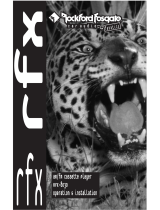
95
REW/FF (Rewind/Fast forward)
Push the “FF” side of the button to fast for-
ward a cassette tape. “FF” will appear on
the display. Push the “REW” side to re-
wind a tape. “REW” will appear on the dis-
play.
To stop the tape while it is fast forwarding,
push “FF” or “TAPE”; to stop the tape
while it is rewinding, push “REW” or
“TAPE”. The tape will immediately begin
to play.
If a tape side rewinds completely, the cas-
sette player will stop and then play that
same side. If a tape fast forwards com-
pletely, the cassette player will play the
other side of the tape, using the auto-re-
verse feature.
R⋅M (Radio monitor)
Type 2-2 only
The radio monitor feature allows you to
listen to the radio while a cassette is being
rewound or fast forwarded.
Push “R⋅M”. “R⋅M” will appear on the dis-
play. Any time you are rewinding or fast
forwarding a cassette tape, the radio will
play the station that was set most recent-
ly. (You can not change the radio station
unless you switch out of the cassette play-
er function.)
Push “R⋅M” again to turn off the R⋅M fea-
ture.
RPT (Repeat)
Type 2-2 only
The repeat feature automatically replays
the current cassette.
Push “RPT” while the track is playing.
“RPT” will appear on the display. When
the track ends, it will automatically be re-
wound and replayed. This process will be
continued until you push the button again
to turn off the repeat feature.
There must be at least 3 seconds of blank
space between tracks in order for the re-
peat feature to work correctly.
SCAN
You can either scan all the frequencies on
a band or scan only the preset stations for
that band.
To scan the preset stations: Quickly push
and release “SCAN”. If you hear a beep,
you held the button too long, and the radio
will scan all the frequencies. The radio will
tune in the next preset station up the
band, stay there for a few seconds, and
then move to the next preset station. To
select a station, push “SCAN” a second
time.
To scan all the frequencies: Push “SCAN”
until you hear a beep. The radio will find
the next station up the station band, stay
there for a few seconds, and then scan
again. To select a station, push “SCAN” a
second time.
Cassette Player
Type 2-2 only
The cassette player scan feature is similar
to the radio scan feature and uses the
same button.
Push “SCAN”. “SCAN” will appear on the
display. The player will fast forward to the
next cassette track, play it for 12 seconds,
and then scan again. To select a track,
push “SCAN” a second time. If the player
reaches the end of one side of a cassette
tape, it will continue scanning on the other
side.
SKIP
Type 2-2 only
The skip feature allows you to fast forward
past long stretches of blank tape. This is
especially useful at the end of cassettes.




















